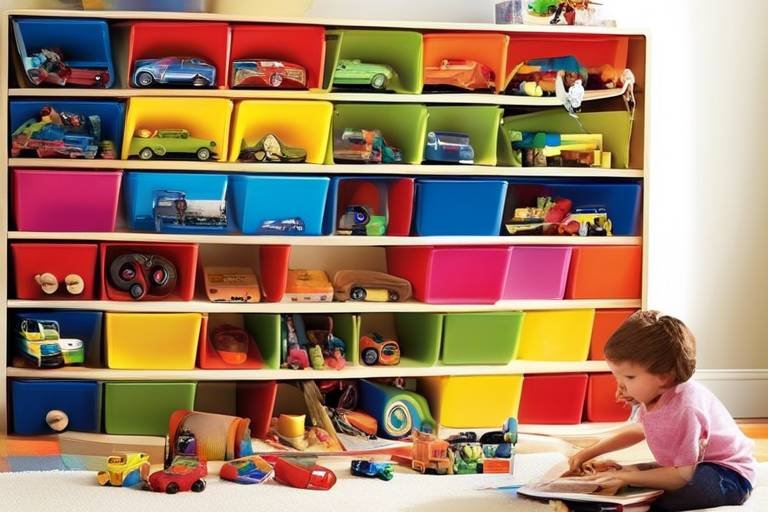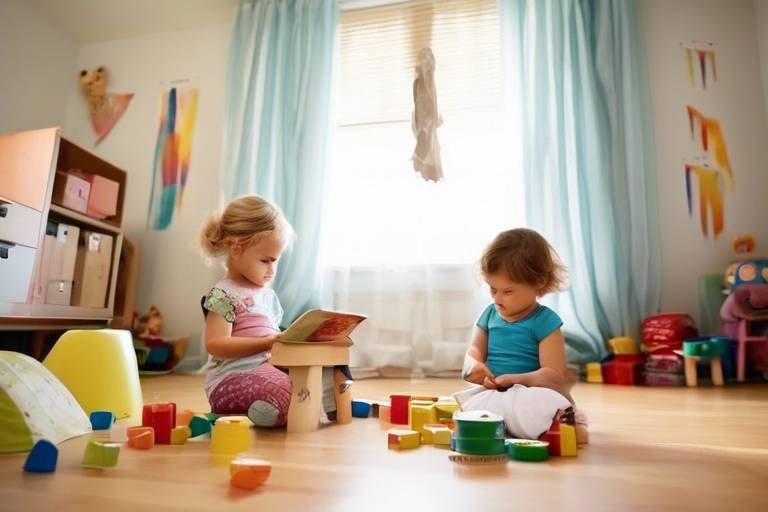Establishing Family Rituals: A Guide
Family rituals are not just quaint traditions; they are the threads that weave together the fabric of our lives. Imagine a tapestry, rich in color and texture, each thread representing a moment shared, a memory created, and a bond strengthened. In today's fast-paced world, where distractions are abundant and time slips away like sand through our fingers, establishing family rituals becomes even more essential. These rituals serve as anchors in our lives, providing a sense of stability and belonging. They can be as simple as a weekly family dinner or as elaborate as holiday celebrations that span generations. The beauty lies in their ability to create lasting memories and foster emotional connections that endure through time.
In this guide, we will explore the significance of family rituals, delve into the various types that exist, and provide practical steps to help you create meaningful traditions. Whether you are looking to strengthen your family bonds or simply want to add a little magic to your everyday life, this article will equip you with the knowledge and inspiration needed to embark on this rewarding journey.
Why should we care about family rituals? Well, think of them as the glue that holds your family together. They create a sense of belonging and security, especially for children who thrive on routine. When families engage in regular rituals, they cultivate a shared identity and a sense of purpose. These practices can enhance emotional well-being by providing comfort and predictability. For instance, a simple ritual like sharing stories during dinner can spark conversations that lead to deeper understanding and empathy among family members.
Moreover, family rituals help to create a treasure trove of shared memories. When you look back on your life, what do you remember most vividly? Often, it’s the moments spent together, whether it’s laughing around the dinner table, playing games, or celebrating milestones. These rituals not only enrich our lives but also help us navigate challenges together, making us resilient in the face of adversity.
Family rituals come in many shapes and sizes. They can be categorized into several types, each serving unique purposes and benefits. Understanding these categories can help you identify which rituals may resonate most with your family.
Daily rituals are the heartbeat of family life. They create a sense of normalcy and routine that can be incredibly grounding. Think about your day-to-day activities—simple things like having breakfast together, sharing a bedtime story, or even a morning hug can become cherished rituals. These small practices may seem insignificant, but they can significantly impact family dynamics and relationships. They encourage open communication and provide opportunities for family members to connect on a deeper level.
Setting aside time for weekly family activities can work wonders for strengthening bonds. Whether it’s game night, movie night, or a family outing, these consistent engagements foster shared experiences that create lasting memories. Imagine the joy of laughter echoing through your home as everyone gathers to play board games or the excitement of exploring a new park together. These moments, while seemingly simple, can create a strong foundation for family unity.
Holiday traditions are often the highlight of family life. They provide opportunities for families to come together and celebrate their unique heritage and values. From decorating the Christmas tree to hosting a summer barbecue, these rituals can enhance family identity and create lasting memories that are passed down through generations. They instill a sense of belonging and pride, allowing family members to connect with their roots and each other.
Establishing new family rituals can breathe fresh life into your family dynamics. It’s like planting a seed that grows into a beautiful tree over time. Here are some practical tips to help you create meaningful traditions:
- Involve Everyone: Make sure all family members have a say in what rituals are created. This fosters ownership and excitement.
- Reflect Your Values: Choose rituals that resonate with your family's values and beliefs, making them more meaningful.
- Be Flexible: Adapt rituals as your family grows and changes. What works now may evolve over time.
While establishing family rituals can be incredibly rewarding, it may come with its own set of challenges. Recognizing these obstacles is the first step in overcoming them.
Finding a balance between individual preferences and collective family rituals can be tricky. Each family member may have different interests and schedules, making it essential to accommodate diverse interests while maintaining family unity. Consider rotating the choice of activities, ensuring everyone feels included and valued.
In our busy lives, finding time to establish rituals can feel daunting. However, time management strategies can help families prioritize and create meaningful traditions. Schedule regular family time on your calendar, treat it as an important appointment, and watch how it transforms your family interactions. Remember, it’s not about the quantity of time spent together but the quality of those moments that truly matters.
Q: How can I start a family ritual?
A: Begin with something simple, like a weekly family dinner or movie night. Involve everyone in the planning to ensure it resonates with all family members.
Q: What if my family is too busy?
A: Prioritize family time by scheduling it like any other important commitment. Even short, meaningful interactions can make a difference.
Q: Can rituals change over time?
A: Absolutely! As families grow and change, rituals can and should evolve to reflect new dynamics and interests.

The Importance of Family Rituals
Family rituals are not just quaint traditions; they are the lifeblood of familial connections. Imagine a cozy evening where everyone gathers around the dinner table, sharing stories and laughter. This simple act is more than just a meal; it's a ritual that nurtures emotional bonds. In our fast-paced world, these rituals provide a much-needed anchor, offering stability and a sense of belonging. They help families navigate the ups and downs of life together, creating a shared narrative that strengthens relationships.
Research shows that families who engage in regular rituals experience enhanced emotional well-being. Think of it as a glue that holds the family unit together. When families participate in rituals, they create a shared identity that fosters a feeling of unity. These practices can range from simple daily routines to elaborate holiday traditions, but each serves a critical purpose. They help children feel secure and understood, which is vital for their emotional development.
Moreover, rituals provide a framework for communication. During family gatherings, children and adults alike learn to express their feelings and listen to one another. This exchange builds trust and empathy, essential components of healthy relationships. To put it simply, family rituals are like a warm blanket on a chilly day; they offer comfort and security, reminding us that we are never alone.
In addition, family rituals create lasting memories. Picture a warm summer evening filled with laughter as family members gather for a backyard barbecue. These moments become cherished memories that families look back on fondly, reinforcing their bonds. Over time, these shared experiences weave a rich tapestry of family history that can be passed down through generations. The stories and traditions that evolve from these rituals become part of a family's legacy, enriching the lives of future members.
Ultimately, the importance of family rituals cannot be overstated. They are the threads that weave individuals into a cohesive unit, creating a sense of belonging and purpose. In a world where everything seems transient and fast-paced, establishing these meaningful traditions can be the key to a fulfilling family life. So, why not take a moment to reflect on your own family rituals? What traditions can you enhance or create to strengthen your family's emotional connections?
- What are family rituals? Family rituals are practices or traditions that families engage in regularly, creating a sense of connection and belonging.
- Why are family rituals important? They foster emotional bonds, create lasting memories, and provide stability and security within the family unit.
- What types of family rituals can we establish? Families can create daily routines, weekly activities, or special holiday traditions that reflect their values and interests.
- How can we create new family rituals? Start by identifying activities that everyone enjoys and make a commitment to engage in them regularly.
- What challenges might we face in establishing rituals? Common challenges include balancing individual preferences and managing time constraints, but these can be overcome with communication and planning.

When we think about family rituals, it’s essential to realize that they come in various forms, each serving a unique purpose in strengthening family bonds. These rituals can be categorized into three primary types: daily rituals, weekly activities, and holiday or seasonal traditions. Each type plays a vital role in creating a sense of belonging and continuity within the family unit. Let’s dive deeper into these categories and explore how they contribute to a cohesive family life.
Daily family rituals are those small, seemingly mundane activities that we often overlook, yet they hold immense power in shaping our family dynamics. Think about the simple act of gathering around the dinner table for a meal. This daily ritual not only provides nourishment but also creates a sacred space for communication and connection. During these moments, family members share their daily experiences, joys, and challenges, fostering a supportive environment. Other examples of daily rituals include:
- Bedtime stories that ignite imagination and create a sense of security.
- Morning routines that may include shared breakfasts or preparing for the day together.
- Evening wind-downs, where families reflect on their day and express gratitude.
These daily rituals may seem small, but they build a foundation of trust and emotional safety, making family members feel valued and heard.
Transitioning from daily to weekly, it’s crucial to set aside dedicated time for family activities. These can be anything from game nights, movie marathons, or outdoor adventures. The key here is consistency. When families prioritize these weekly gatherings, they cultivate a sense of anticipation and excitement. Imagine the joy of a Saturday night game night where everyone competes, laughs, and creates memories together. It’s these moments that become the stories we reminisce about in years to come.
Moreover, engaging in shared activities strengthens interpersonal relationships and encourages teamwork. Families can even rotate the responsibility of choosing the activity, allowing everyone to contribute to the family’s collective experience. This inclusivity ensures that every member feels valued and part of the family’s journey.
Holiday traditions are perhaps the most vivid and cherished family rituals. They provide an opportunity for families to come together and celebrate, often creating lasting memories that are passed down through generations. Whether it’s decorating the Christmas tree, preparing a special meal for Thanksgiving, or celebrating cultural festivals, these rituals enhance family identity and create a sense of belonging. They serve as anchors in our lives, reminding us of our roots and the values we hold dear.
Moreover, seasonal traditions can also play a significant role. For instance, summer barbecues or fall apple-picking adventures not only celebrate the season but also reinforce family ties. These shared experiences help to create a narrative that families can look back on with fondness, strengthening their emotional connections.
As families evolve, so too should their rituals. Establishing new family traditions can rejuvenate connections and introduce fresh experiences. This could be as simple as starting a new weekly cooking night where everyone contributes a dish or embarking on an annual family trip to a new destination. The important thing is to ensure that these new rituals resonate with the family’s values and interests.
In conclusion, understanding the types of family rituals can help families recognize the importance of these practices in their lives. Whether through daily routines, weekly activities, or seasonal celebrations, each ritual contributes to a richer family life, fostering emotional connections that last a lifetime.
Q: What are family rituals?
A: Family rituals are repeated actions or traditions that families engage in together, fostering connection and creating memories.
Q: Why are daily rituals important?
A: Daily rituals create a sense of normalcy and stability, helping family members feel secure and connected.
Q: How can we create new family rituals?
A: Start by discussing interests as a family and choose activities that everyone can enjoy, ensuring they reflect your family’s values.
Q: What if we have busy schedules?
A: Prioritize quality over quantity. Even short, meaningful rituals can have a significant impact.

Daily family rituals are the heartbeat of a household, creating a rhythm that fosters connection and stability. Think about it: when you have a set routine, it’s like having a safety net that catches you when life gets a bit chaotic. These rituals can be as simple as sharing breakfast together or reading a bedtime story. They provide a sense of normalcy and predictability, which is incredibly comforting, especially in our fast-paced world. But why are these small practices so impactful? Well, they offer a consistent opportunity for family members to engage with one another, share their thoughts, and create lasting memories.
One of the most cherished daily rituals is the family meal. Imagine gathering around the table, the aroma of your favorite dish wafting through the air, and everyone sharing their day. It’s not just about the food; it’s about the conversations that unfold. During these meals, family members can discuss their highs and lows, laugh together, and even resolve conflicts. This simple act of coming together can strengthen bonds and enhance emotional connections, making family members feel valued and heard.
Another powerful daily ritual is the bedtime routine. Whether it’s reading a story, sharing what you’re grateful for, or simply snuggling before sleep, these moments can be magical. They provide a calm space to unwind and connect, allowing children to feel secure and loved. Have you ever noticed how a goodnight kiss can set the tone for a peaceful night? These rituals not only help children transition into sleep but also reinforce the idea that family is a safe haven.
To illustrate the variety of daily rituals, consider the following table that highlights some common practices and their benefits:
| Daily Ritual | Benefits |
|---|---|
| Family Meals | Encourages communication, strengthens bonds, and promotes healthy eating habits. |
| Bedtime Stories | Fosters a love for reading, enhances imagination, and provides comfort. |
| Morning Check-ins | Sets a positive tone for the day and allows family members to express their feelings. |
Incorporating these daily rituals into your family life doesn’t have to be complicated. Start small and be consistent. You might decide to have breakfast together every morning or set aside time for a nightly chat before bed. The key is to make these rituals enjoyable, so they feel less like a chore and more like a cherished tradition. Remember, the goal is to create a space where everyone feels connected and valued.
Ultimately, daily family rituals are about creating a tapestry of shared experiences that bind family members together. They are the threads that weave through the fabric of our lives, creating a sense of belonging and love. So, the next time you sit down for a meal or tuck your child into bed, remember that these moments are not just routine; they are the foundation of a strong family bond.

Setting aside dedicated time for weekly family activities can be a game changer for any household. Think of it as a special appointment that everyone looks forward to, much like a date with your favorite movie or a night out with friends. These activities not only strengthen family bonds but also create a treasure trove of shared experiences that can be reminisced about for years to come. Imagine the laughter, the joy, and sometimes even the chaos that ensues during these gatherings! It's in these moments that families truly connect, fostering a sense of belonging and unity.
But what exactly can these activities look like? The beauty of weekly family activities is that they can be tailored to fit your family's unique interests and schedules. Whether it's a game night, where laughter fills the room as you compete over board games, or a weekly outing to a local park or museum, the options are endless. The key is consistency; setting a specific day and time each week can help everyone adjust their schedules to prioritize family time. For instance, you might choose Friday evenings for a pizza night, where everyone pitches in to make their own personal pizzas. This not only makes for a fun evening but also teaches kids valuable cooking skills!
To give you an idea of how you might structure your weekly family activities, here’s a simple table showcasing different ideas:
| Day | Activity | Benefits |
|---|---|---|
| Monday | Movie Night | Encourages relaxation and bonding |
| Wednesday | Game Night | Promotes teamwork and friendly competition |
| Saturday | Outdoor Adventure | Enhances physical health and appreciation for nature |
| Sunday | Cooking Together | Teaches skills and fosters teamwork |
Another fantastic aspect of weekly family activities is the opportunity for everyone to contribute ideas. Encourage each family member to suggest activities they would like to try. This not only ensures that everyone feels included but also introduces variety into your routine. You might find that your teenager wants to try a new sport, while your younger kids might be excited about arts and crafts. By mixing it up, you keep the excitement alive and ensure that family time never feels like a chore.
In conclusion, weekly family activities are more than just a way to fill the calendar; they are an essential ingredient for a happy, connected family. They provide a space for open communication, shared laughter, and unforgettable memories. So, why not start planning your first activity today? After all, the best moments in life are often those spent with loved ones, creating stories that will be told for generations.
- How often should we have family activities? Ideally, aim for once a week, but adjust based on your family's schedule.
- What if we have different interests? Encourage everyone to take turns choosing activities to ensure everyone feels included.
- What if we can't find time? Prioritize family time like any other important appointment; it can be as simple as a shared meal.

Holiday and seasonal traditions are not just festive activities; they are the threads that weave families together, creating a rich tapestry of shared experiences and cherished memories. Think of these traditions as the glue that holds the family unit together, especially during special times of the year. Whether it’s gathering around the dinner table for a Thanksgiving feast, decorating a Christmas tree, or participating in a summer barbecue, these rituals foster a sense of belonging and identity. They provide a chance for families to pause amidst the chaos of daily life and reconnect with one another.
One of the most beautiful aspects of holiday traditions is their ability to evolve over time. As families grow and change, so too can their rituals. For instance, a family may start with simple traditions when children are young, such as reading holiday stories together or creating handmade decorations. As the children grow, these traditions can transform into more elaborate celebrations, like hosting family reunions or organizing themed parties. This evolution not only keeps the traditions fresh but also allows each family member to contribute their unique flair, making the celebrations even more special.
Moreover, holiday rituals often serve as a bridge between generations. Imagine a grandparent sharing stories of their childhood celebrations, passing down recipes that have been in the family for decades, or teaching grandchildren how to make traditional crafts. These moments are invaluable; they create a sense of continuity and help younger family members appreciate their heritage. The emotional connections forged during these times can lead to stronger family bonds, as everyone shares in the joy and nostalgia of past celebrations.
To illustrate the impact of holiday traditions, here’s a simple table that highlights some common seasonal practices and their benefits:
| Tradition | Benefits |
|---|---|
| Thanksgiving Dinner | Encourages gratitude and family bonding |
| Christmas Tree Decorating | Fosters creativity and teamwork |
| Summer Family BBQ | Strengthens relationships through casual gatherings |
| New Year’s Resolutions | Promotes goal-setting and support |
In addition to fostering unity, holiday traditions can also create a sense of excitement and anticipation within the family. Children, in particular, thrive on routine and the thrill of looking forward to something special. The countdown to a holiday can be filled with activities that build anticipation, such as making decorations or planning surprise gifts. These shared moments of excitement not only enhance the joy of the holiday itself but also cultivate a sense of belonging and security among family members.
As families navigate the complexities of modern life, it’s essential to carve out time for these meaningful rituals. The hustle and bustle may tempt families to skip traditions or reduce their significance, but it’s crucial to remember that these moments are what truly enrich our lives. By prioritizing holiday and seasonal traditions, families can ensure that they remain connected, creating lasting memories that will be cherished for years to come.
- What are some easy holiday traditions to start? Simple traditions like family movie nights, baking cookies together, or creating a gratitude jar can be great starting points.
- How can we create new traditions that involve everyone? Involve all family members in the planning process; ask for their input and preferences to ensure everyone feels included.
- What if our family is busy and can’t find time for traditions? Focus on quality over quantity; even small rituals can have a significant impact if done consistently.

Establishing new family rituals can be an exciting adventure that breathes fresh life into family dynamics. Think of it as planting a seed in the garden of your family life; with a little care and attention, it can blossom into something beautiful and meaningful. The key is to reflect on what matters most to your family and to create rituals that resonate with everyone’s interests and values. So, how do you go about this? Let's dive into some practical steps!
First off, communication is crucial. Sit down with your family and have an open discussion about what rituals you might want to create. This could be as simple as asking everyone to share their favorite family memories or traditions they enjoyed growing up. This not only helps in generating ideas but also makes each family member feel valued and heard. You might be surprised by the suggestions that come up! For example, someone might suggest a monthly movie night, while another might dream of a yearly camping trip.
Next, consider the interests and hobbies of your family members. Are you a family of foodies? Perhaps cooking a new recipe together every week could be your thing. Do you love the outdoors? Maybe establishing a weekly nature walk could be the perfect bonding experience. The goal is to create rituals that everyone looks forward to, turning ordinary moments into extraordinary memories.
Once you've brainstormed ideas, it’s time to set a schedule. Consistency is key when it comes to rituals. Whether it's a weekly game night or an annual family reunion, having a regular time slot helps everyone remember and prioritize these moments. You might even want to create a family calendar to keep track of your new traditions. This not only serves as a reminder but also builds anticipation, making your family events something to look forward to.
However, it’s important to remain flexible. Life can get busy, and sometimes rituals may need to be adjusted or postponed. The magic lies not in perfection but in the shared experiences and the love that binds you together. If one week you can’t make it to your movie night, don’t stress! Just reschedule and keep the spirit alive. The essence of a ritual is the connection it fosters, not necessarily the strict adherence to a schedule.
Finally, don’t underestimate the power of celebration. Once your new family ritual is established, take time to celebrate it! This could be as simple as sharing stories about your experiences or even creating a scrapbook to document your journey. Celebrating these moments reinforces their importance and creates a sense of pride in your family’s unique traditions.
Creating new family rituals is not just about the activities themselves; it’s about the connections you forge and the memories you create together. So gather your loved ones, brainstorm ideas, and embark on this exciting journey of building lasting traditions that reflect your family's unique identity!
- What are some examples of family rituals? Family rituals can include anything from weekly game nights, seasonal outings, or even daily routines like cooking dinner together.
- How often should we establish new rituals? There’s no set rule! You can introduce new rituals as often as you like, but consistency in existing ones is key for strengthening family bonds.
- What if family members disagree on the type of rituals? Open communication is essential. Discuss each person’s preferences and find a compromise that incorporates elements from everyone's suggestions.

Establishing family rituals can be a rewarding journey, but it’s not without its challenges. Imagine trying to build a sandcastle at the beach; you have the right tools and the perfect spot, but a sudden wave can come crashing in, disrupting your plans. Similarly, families often face obstacles that can derail their efforts to create meaningful traditions. One of the most significant challenges is balancing individual needs. Each family member brings their unique preferences and interests to the table, and finding common ground can be tricky. For instance, while one child may crave adventure and outdoor activities, another might prefer quiet evenings spent reading. This diversity can lead to tension if not managed well.
Moreover, time constraints are a major hurdle in today's fast-paced world. With busy schedules filled with work, school, and extracurricular activities, families often struggle to carve out time for rituals. It’s like trying to find a needle in a haystack! However, prioritizing family time can significantly enhance emotional connections. Families need to recognize the importance of these rituals and make a conscious effort to integrate them into their lives. This might mean sacrificing some individual activities or re-evaluating schedules to create space for shared experiences.
Another challenge is the fear of failure. Families may worry that their attempts to establish rituals will fall flat or not resonate with everyone. This fear can be paralyzing, leading to inaction. However, it’s important to remember that the goal isn’t perfection; it’s connection. Embracing the idea that rituals can evolve and change over time can alleviate this pressure. For instance, a weekly game night might start with board games but could later include movie nights or themed dinners, allowing everyone to contribute to the family experience.
To navigate these challenges, families can adopt a few strategies:
- Open Communication: Encourage family discussions where everyone can share their thoughts and preferences. This fosters a sense of inclusion and helps identify common interests.
- Flexibility: Be willing to adapt rituals as needed. If something isn't working, don’t hesitate to tweak it or try something new.
- Start Small: Begin with simple rituals that require minimal time commitment. As these become established, you can gradually expand them.
In conclusion, while establishing family rituals can come with its share of challenges, the benefits far outweigh the obstacles. By focusing on communication, flexibility, and starting small, families can create lasting traditions that enhance their bonds and enrich their lives.
Q1: What are family rituals?
Family rituals are intentional practices or routines that families engage in together to strengthen their bonds and create shared memories. They can be as simple as having dinner together or as elaborate as holiday traditions.
Q2: Why are family rituals important?
Family rituals provide a sense of stability and belonging, enhance emotional connections, and create opportunities for meaningful interactions among family members.
Q3: How can we create new family rituals?
To create new family rituals, start by discussing what activities everyone enjoys. Choose a regular time to engage in these activities, and be open to trying new things together.
Q4: What if family members have conflicting interests?
It's essential to communicate openly. Try to find a compromise that includes elements from everyone's preferences, or rotate activities to ensure everyone has a chance to participate in what they love.

Finding the perfect balance between individual preferences and collective family rituals can sometimes feel like walking a tightrope. Each family member brings their own unique interests, hobbies, and schedules to the table, which can make it challenging to establish traditions that everyone enjoys. Imagine trying to plan a family game night when one child is obsessed with video games, another prefers board games, and the adults just want a quiet evening! The key is to embrace the diversity within your family while still fostering a sense of togetherness.
One effective way to achieve this balance is by involving everyone in the decision-making process. For instance, consider hosting a family meeting where each member can express their ideas and preferences for potential rituals. This not only empowers individuals but also helps in creating a sense of ownership over the family traditions. You might be surprised at how much excitement can stem from simply sharing these ideas!
Additionally, it’s essential to be flexible and open-minded. If a family member suggests a new activity that doesn’t initially appeal to others, give it a try! You might find that stepping out of your comfort zone leads to unexpected joy and laughter. Think of it as a potluck dinner where everyone brings their favorite dish; the variety makes the meal more interesting and enjoyable for everyone.
To illustrate how you can balance these needs, here’s a simple table showing different family members' preferences and possible rituals that can cater to them:
| Family Member | Preference | Suggested Ritual |
|---|---|---|
| Child 1 | Video Games | Video Game Tournament Night |
| Child 2 | Board Games | Board Game Marathon |
| Parent 1 | Cooking | Family Cooking Night |
| Parent 2 | Outdoor Activities | Weekend Hiking Adventures |
As you can see, by acknowledging each family member's interests and suggesting rituals that incorporate those preferences, you create a harmonious environment where everyone feels valued. It’s about blending the different tastes into a delightful family stew that nourishes the bonds you share.
Ultimately, the goal is to create rituals that resonate with everyone, allowing for both personal expression and collective enjoyment. Remember, it’s not about perfection; it’s about connection. So, keep the lines of communication open, be willing to compromise, and most importantly, have fun with the process of building lasting family traditions!
- What are family rituals? Family rituals are practices or traditions that families engage in regularly to strengthen bonds and create lasting memories.
- How can I involve my kids in creating family rituals? Involve your kids by asking for their input during family meetings and encouraging them to suggest activities they enjoy.
- What if my family has different interests? Try to find common ground by blending various interests into one activity or alternating between different preferences.
- Can family rituals change over time? Yes! As family dynamics evolve, so can your rituals. It's essential to revisit and adapt them as needed.

In today’s fast-paced world, finding time for family rituals can feel like trying to catch smoke with your bare hands. Between work commitments, school activities, and social obligations, it often seems like there are just not enough hours in the day to carve out time for meaningful family traditions. However, it's crucial to recognize that establishing these rituals can significantly enhance family bonds and emotional connections. So, how can we navigate the whirlwind of daily life while still prioritizing our family? Here are some strategies to consider:
First and foremost, it’s essential to prioritize family time. Think of it as a non-negotiable appointment in your calendar. Just like you wouldn’t skip a meeting with your boss, don’t overlook your family gatherings. Block out specific times each week dedicated solely to family activities, whether it’s a game night, a movie marathon, or simply cooking dinner together. Consistency is key, and having these time slots will help everyone adjust their schedules accordingly.
Another effective approach is to integrate rituals into existing routines. For instance, if your family already has a busy morning routine, consider adding a quick breakfast ritual where everyone shares one thing they are looking forward to that day. This simple addition can transform a mundane routine into a meaningful moment of connection. By weaving rituals into the fabric of your daily life, you can create lasting memories without needing to carve out extra time.
Additionally, it’s important to be realistic about what you can achieve. Not every ritual has to be elaborate or time-consuming. Sometimes, the simplest traditions can have the most profound impact. For example, a quick five-minute evening check-in where everyone shares their highs and lows of the day can foster open communication and emotional support. Remember, it’s not about the quantity of time spent together, but the quality of those moments that truly matters.
Lastly, don’t shy away from involving everyone in the planning process. Ask your family members what activities they would enjoy or what rituals they would like to establish. This not only helps in accommodating individual preferences but also ensures that everyone feels invested in the family traditions. When everyone is on board, the chances of maintaining these rituals increase significantly.
In conclusion, while time constraints can pose challenges in establishing family rituals, they are not insurmountable. With a little creativity, prioritization, and involvement from all family members, you can create meaningful traditions that enrich your family life. Remember, it’s all about making the most of the time you have together and cherishing those moments, no matter how small they may seem.
- What are some examples of simple family rituals?
Simple family rituals can include having a weekly family dinner, reading a bedtime story, or sharing a morning coffee together. - How can I involve my children in creating family rituals?
Encourage your children to suggest activities they enjoy or to help plan family outings. This involvement fosters a sense of ownership and excitement about the rituals. - What if my family has different schedules?
Try to find overlapping times that work for everyone, and be flexible. Sometimes, rituals can be adapted or rotated to fit different schedules.
Frequently Asked Questions
- What are family rituals and why are they important?
Family rituals are meaningful activities or traditions that families engage in together. They are important because they help strengthen family bonds, create lasting memories, and provide a sense of stability and security for all members. Just like a favorite song can bring back memories, family rituals can evoke feelings of togetherness and love.
- What types of family rituals can we establish?
There are several types of family rituals you can establish, including daily routines like family meals, weekly game nights, and special holiday traditions. Each type serves a unique purpose, whether it’s fostering daily connection or celebrating special occasions. Think of them as the threads that weave your family’s story together!
- How can we create new family rituals?
Creating new family rituals can be as simple as setting aside time for a weekly movie night or starting a new tradition during holidays. The key is to involve everyone in the planning process, ensuring that the ritual reflects your family’s values and interests. It’s all about making memories that resonate with your family’s identity!
- What challenges might we face when establishing family rituals?
Some common challenges include balancing individual preferences and busy schedules. It can be tough to find activities that everyone enjoys, especially when life gets hectic. However, with open communication and a little creativity, you can overcome these obstacles and make family rituals a priority!
- How can we manage time constraints while establishing rituals?
To manage time constraints, consider scheduling family rituals during times that naturally work for your family, like weekends or during dinner. You can also start small with short, simple activities that don’t require a lot of preparation. Remember, it’s the quality of time spent together that counts, not the quantity!



















